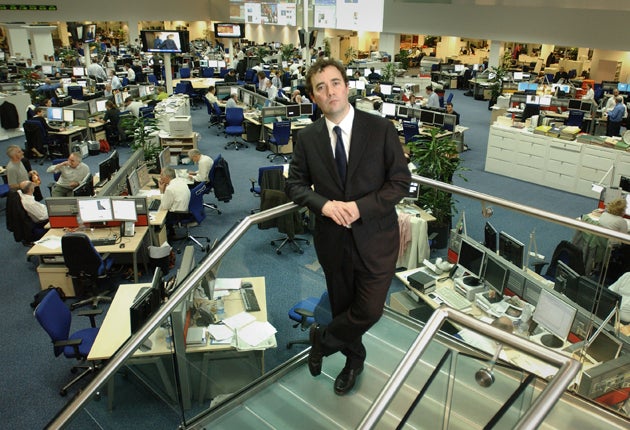If even Will Lewis isn't safe from MacLennan, who is?
The Telegraph chief executive has a history of dismissing editors, reports Matthew Bell

Your support helps us to tell the story
From reproductive rights to climate change to Big Tech, The Independent is on the ground when the story is developing. Whether it's investigating the financials of Elon Musk's pro-Trump PAC or producing our latest documentary, 'The A Word', which shines a light on the American women fighting for reproductive rights, we know how important it is to parse out the facts from the messaging.
At such a critical moment in US history, we need reporters on the ground. Your donation allows us to keep sending journalists to speak to both sides of the story.
The Independent is trusted by Americans across the entire political spectrum. And unlike many other quality news outlets, we choose not to lock Americans out of our reporting and analysis with paywalls. We believe quality journalism should be available to everyone, paid for by those who can afford it.
Your support makes all the difference.On the wall of Murdoch MacLennan's office, there used to be a cartoon of him in a toga, wearing a crazed smile and holding a knife, with a trail of blood and bodies behind him. "Massivus knifus" was the cod-Latin caption.
That was in the early 1990s, when he was managing director of the Scottish Daily Record, but this fearsome image was burnished last week when he added Will Lewis, the award-winning former Daily Telegraph editor, to his list of scalps, after a disagreement over the future of the independent digital strategy unit Lewis had given up his editorship to run.
If MacLennan's reputation for overseeing sackings preceded his arrival as managing director of the Telegraph Group in October 2004, his victims have always been members of the paper's "old guard". Not so Lewis, who joined the paper soon after MacLennan, in 2005, and was responsible for implementing a radical shake-up to ditch the paper's fogeyish past, creating instead a multi-platform media operation. For most of the past five years, Lewis and MacLennan have been allies.
And yet Lewis's departure on Thursday was not a surprise to everyone. One senior Fleet Street executive won a substantial amount of money on Thursday, having bet that Lewis would not survive the year. "Why would anyone give up editing a newspaper to launch a digital unit with no idea of the outcome?" he said.
As the adjacent column noted two weeks ago, Lewis's secretive project has been trying to come up with a viable digital business model for six months and has yet to achieve anything, except have its computers burgled. This apparent lack of action was, it turns out, what prompted MacLennan to re-evaluate Lewis's position.
According to one Telegraph insider, Lewis gave a presentation to MacLennan early last week, on what his team of 50 staff have come up with so far. MacLennan described his plans as "horse shit". Lewis exploded, saying MacLennan couldn't talk to him like that, and that he had Aidan Barclay's full backing. "We'll see about that," came Maclennan's response.
Murdoch MacLennan declined to speak to this newspaper, but those who know him describe a ruthless businessman whose cheery, clubbable manner swaddles a steel core. One colleague describe him as an adept politician: "He is quiet and pleasant, like one of those sinister courtiers in Elizabethan dramas. He hasn't any ideas of his own but he's good at soothing the royal brow."
His path to influence began as a graduate trainee on The Scotsman, long before it was bought by Sir David and Frederick Barclay, his current employers. By the late 1970s, MacLennan had already made a name for himself as a print manager. He joined the Scottish Daily Record and Sunday Mail, later moving to its sister title the Mirror and then Associated Newspapers. In April 1993, a Mail on Sunday article by business reporter William Lewis named MacLennan as one of several Mirror executives to have received pay rises of up to 63 per cent.
At the Daily Mail, which he rejoined in the mid-1990s as group managing director of Associated Newspapers, his nickname was MacGifty, on account of his habit of showering colleagues with gifts. This generosity, it is said, stemmed from a desire to be liked, and an old-fashioned Fleet Street belief in munificence.
As he was sacking one of the Telegraph's most senior business journalists, MacLennan is said to have put his arm round him and said, "I can't believe they're doing this to you. I really can't." Soon after dismissing Sam Leith, the Telegraph's literary editor, MacLennan is said to have run into Leith's mother, Penny Junor, at a party, who asked why he had done it. "What should I do?" said MacLennan. "Shall I resign? Would that make it better?"
This mercurial personality has led some to accuse MacLennan of not being aware of the consequences of his actions. "He wants to be your best friend, then he sacks you," says a former colleague. "He is like the way Churchill described the Germans: he's either at your throat or your feet. There's no intermediate stage," says another.
Lewis is the sixth editor to have left the Telegraph Group since MacLennan's arrival six years ago. He is close to the Barclay brothers, who got through seven editors at The Scotsman during their ten-year ownership. But the Telegraph Group has had a good year, winning all the major press awards for its expenses story. In an interview last year, Will Lewis described his digital "mission", saying "we believe in it; it is showing itself to be successful". But nobody at the Telegraph has admitted any failings, prompting some to quote the old saying "success has many fathers, but failure is a complete bastard".
Join our commenting forum
Join thought-provoking conversations, follow other Independent readers and see their replies
Comments